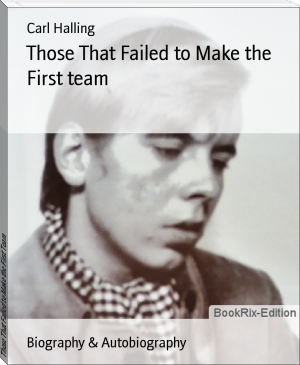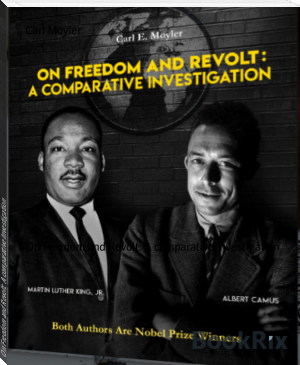Where the Halling Valley River Lies - Carl Halling (lightest ebook reader txt) 📗

- Author: Carl Halling
Book online «Where the Halling Valley River Lies - Carl Halling (lightest ebook reader txt) 📗». Author Carl Halling
Book One – A Quartet of Essays and a Stray Pastorale
Chapter One – Leitmotivs from an English Pastorale
One thing is certain. Paul Runacles had not been born into a typically privileged upper middle class family, and so by the time he arrived at his college, he was bereft of a frame of reference; unlike the majority of his fellow pupils, weaned on the gilded sports of the British social elite.
And he escaped from his college once…like some kind of hysterical gymslip schoolgirl...just the once it was...around ’71 or ’72…to avoid being punished for something stupid he did.
It was an utterly pointless exercise as it was the last day of term, but he just panicked and bolted, and kept on running...until he ended up wandering through some muddy field in the heart of the English countryside before simply giving up and sitting by the side of the road.
But he never did it again, and in later years, when he looked back at his time as a public schoolboy, he’d insist if he possessed a single quality that might be termed noble…such as patience, or self-mastery, or consideration of the needs of other people, then he owed it to his education, and not least the four years he spent at his college.
Yet, looking at the facts after his eventual exit, you’d be forgiven for thinking he’d simply picked up from where he left off before he collapsed in that muddy field in the heart of the English countryside and started drifting in circles again…leaving so many tasks unfinished he effectively wrecked his gilded destiny. But in fact this was far from the truth, for he was never without purpose; but simply…he lacked the go-getter’s ability to turn his dreams to good account.
And looking back on all he’d lost in late middle age, he’d often weep silently to himself at night, at the end of yet another day spent doing really very little when he thought about it.
And there’d be times when certain pieces of quintessentially English pastoral music still had the power to evoke his strange and sudden flight, or rush of blood to the head, of over four decades ago. Such as Vaughan Williams' "The Lark Ascending", which bespeaks a passion for the Arcadian soul of England that verges on the ecstatic. And the same could be said for the opening sections of Mike Oldfield's “Hergest Ridge", which tended to convey to him a deep mournfulness silently existent beneath the picture perfect image of English privilege.
Any argument in favour of such a tragic element would be powerfully reinforced in his eyes by playing the music of the much-loved singer-songwriter Nick Drake, who was not so much handsome as beautiful in what could be called a classically English, soft, wistful, romantic, Shelleyan fashion, with seemingly perfect skin, full lips and a head of cascading curls.
And in some of his many photos, he bears an uncanny resemblance to the former Doors front man Jim Morrison; and like Morrison, he was a poet as much as a musician. But the likeness ends there, for while Morrison was able to conquer his natural shyness and become a wildly charismatic showman, Drake never mastered the art of Rock performance.
However, blessed with a precocious musical genius, he secured a recording contract with the Island label while still only twenty years old and at Cambridge University.
On the surface of things, he was destined for a long and happy life, but unlike his near-double, was unable to translate his enormous gifts into commercial success. And he became very seriously depressed as a result, dying mysteriously at the age of just 26, after having released only three albums in his lifetime.
Looking back from the vantage point of the early 2010s, Runacles couldn’t help thinking that in any era other than that ushered in by the Rock revolution, Drake would have pursued a career more suited to his background and temperament. As opposed to one which, while ensuring his immortality, clearly caused him an inestimable amount of pain.
And he came to maturity in a Britain whose young were in active rebellion against the Judaeo-Christian value system on which the nation had been founded. So was perforce affected by the spiritual chaos of the times, which propelled him towards the endless night of worldly philosophy, deadly for a mind as litmus-paper sensitive as his.
And listening in late middle age to such perfectly English examples of pastoral music as Drake’s “River Man”, which bespeaks a passion for the Arcadian soul of England that verges on the ecstatic, Runacles became suddenly cognizant of a colossal compassion within himself.
But not just for the youthful Runacles… who ran away from his college once like some kind of hysterical gymslip schoolgirl...so much as for the privileged classes as a whole…those traditionally educated at public schools.
A somewhat unusual receptacle for the milk of human kindness, some might say. But the privileged among us are surely no less in need of consideration than any other social class.
For despite the fact that the vast majority of those who pass through the British public school system go on to lead full and successful lives entirely free from melancholy, social advantage can clearly be a heavy burden to bear for some. Such as Nick Drake who sang so devastatingly of “falling so far on a silver spoon” in the dark pastorale, “Parasite”.
As to Runacles…he’d not been born into a typically privileged upper middle class family, and so by the time he arrived at his public school, he was bereft of a frame of reference, unlike the majority of his fellow pupils, weaned on the gilded sports of the British social elite.
Yet, a close connection existed in the shape of his paternal grandmother, born into what was once known as the lower gentry, in as much as her father was independently wealthy, and so had no need to work.
Yet, she left her first husband to live in Australia with a man she’d met in Ceylon while working on a tea plantation, a Danish citizen who’d allegedly once been a successful businessman, until a reversal of fortune reduced him to penury. The outcome was she was cast out into a kind of social exile, exacerbated by the Dane’s slow decline and death from multiple sclerosis. At least, that’s how Runacles saw it.
His mother, on the other hand, was the product of working class immigrants to British Canada from Ulster, Ireland and Lowland Scotland. And it amused him to think there was a good chance distant relatives of his continued to live in these regions.
But that was not the reason he had trouble adapting to public school life, for his brother positively thrived within it.
No, there was something intrinsically askew about Runacles himself. For after all, who thinks of running away on the last day of term without any purpose or aim, only to finish up collapsed by the side of a muddy field in the heart of the English countryside?
The truth is while public schools have long served as the traditional places of learning for future members of the British governing and professional classes, they have never done so in the capacity of pampering wet nurses.
And so not every child who finds themselves within the bosom of such institutions is able to develop along extraverted lines. For during Runacles’ time at his own college, there were boys who responded to the intensely hierarchical nature of public school life with varying degrees of self-effacement. And not just initially, for most new boys are inclined to quail when confronted with this ancient way of life for the first time, but afterwards too. So that they remained relatively quiescent even while succeeding within the system.
Yet he himself was not among them, for while he could hardly be said to have thrived, he was yet happy in his own way, and enormously popular. What they used to call a character. So this strange flight of his was totally out of character…especially seeing as he was famous for his resilience, having been one of the most intensely disciplined pupils of his generation.
But he never ran away again, and in later years, when he looked back at his time as a public schoolboy, he’d insist if he possessed a single quality that might be termed noble…such as patience, or self-mastery, or consideration of the needs of other people, then he owed it to his education, and not least the four years he spent at public school.
Yet, looking at the facts after his eventual exit, you’d be forgiven for thinking he’d simply picked up from where he left off before he collapsed in that muddy field in the heart of the English countryside and started drifting in circles again…leaving so many tasks unfinished he effectively wrecked his gilded destiny. But in fact this was far from the truth, for he was never without purpose; but simply…he lacked the go-getter’s ability to turn his dreams into good account.
Now, souls in thrall to the psychological persuasion might assert that failure in life is but the consummation of an underachieving childhood.
But the Runacles of the early 2010s had no time for theories of this kind, since pupils historically written off by their teachers via the medium of the school report have included the greatest Englishman of them all. No, not Runacles…Churchill.
While many might dispute this fact, and goodness knows Churchill has his detractors, few would go so far as to label him an underachiever.
And Runacles himself was offered multiple opportunities to turn his life around; so why didn’t he do it…simply in order to prove to the world that while a failure on the surface, he’d been a success all along?
There’s no sure way of knowing why…other than to have recourse to a theory earlier expressed in this piece, that there was something intrinsically askew about Runacles himself. For after all, who thinks of running away on the last day of term without any purpose or aim, only to finish up collapsed by the side of a muddy field in the heart of the English countryside?
And who knows how long he’d have sat there, had it not been for the fact that as he did so, his Divinity teacher happened to spy him while driving by before offering him a lift back to college.
And as might be expected, by the time he arrived, there was hardly anyone left; yet, he was summoned his housemaster, who assured him he’d not be punished, for after all, it was the last day of term, and school was over for a month or so, and he was therefore free to do as he wished within the limits of the law.
But there was no one to take him home, as his mother had earlier departed without him, as no one was able to tell her where he was. So he contacted his father, who then set about the hour-long journey from London to Berkshire to pick him up.
And he later heard from his friends about just how frantic with worry his mother been when, after innocently turning up to take her son home, she was informed he was nowhere to be found. One can only imagine what she went through. And looking back





Comments (0)